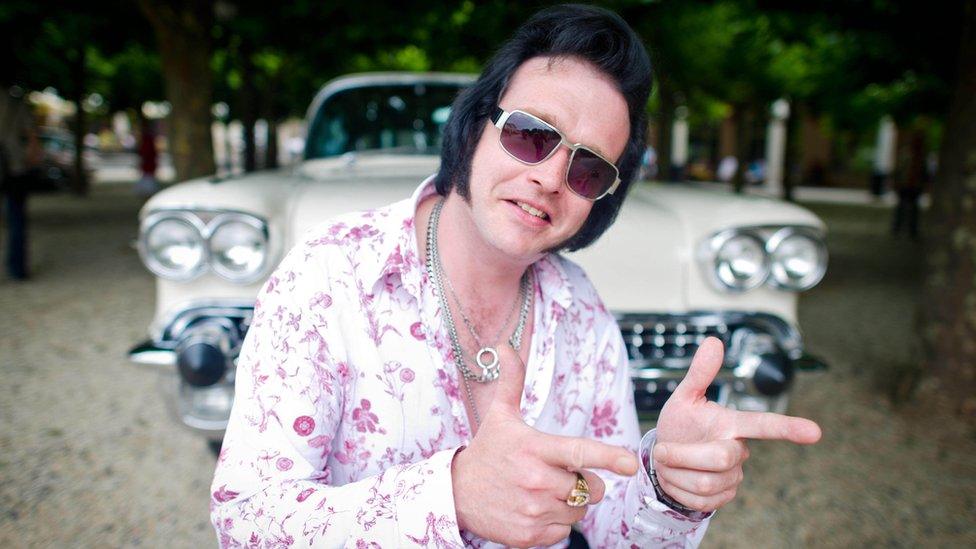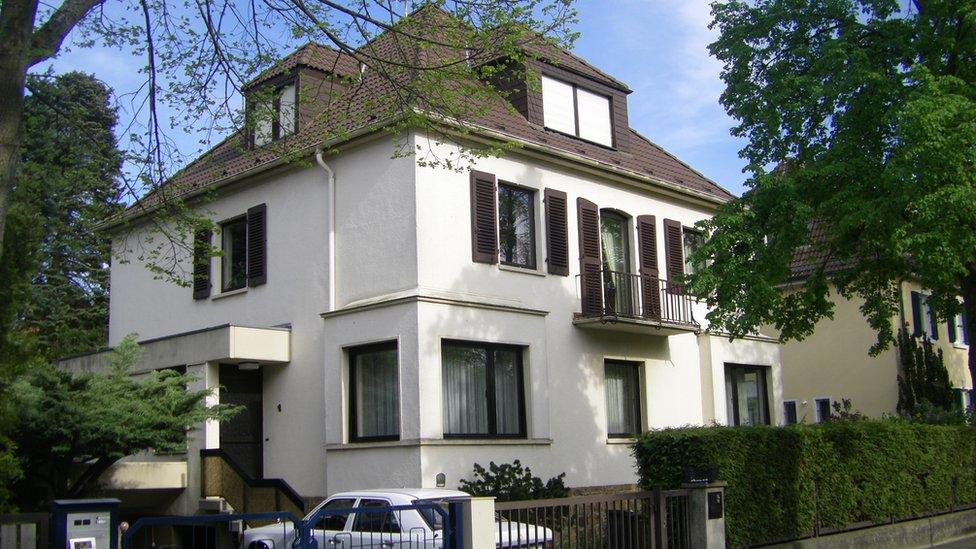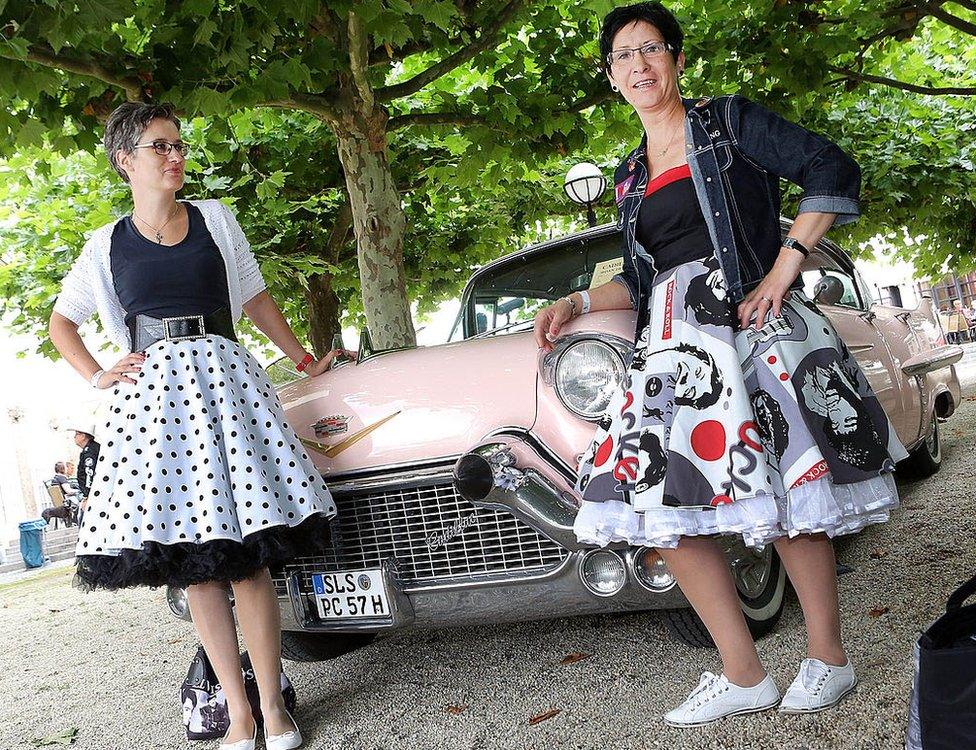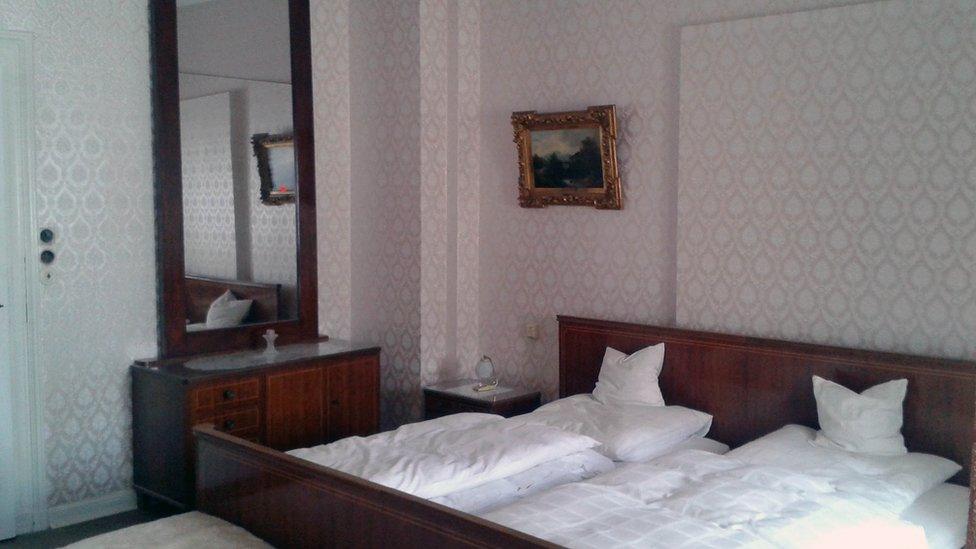Feeling 1% more 'Elvis' in a little town in Germany
- Published

It's 40 years this month since Elvis Presley died. His Graceland mansion in Memphis, Tennessee is a place of pilgrimage for fans - but so too is a German town which, as Rob Crossan found, is very proud of its connection to the King of Rock and Roll.
The street was the very picture of sturdy German middle-class prosperity - dappled, leafy, with white wooden dog-tooth fences, weather vanes and plane trees.
Yet one house seemed a little different. A sporty, defiantly rebellious-looking white BMW 507 coupe was parked outside and a small cardboard sign by the front gate read: "Autographs: 7:30-8pm."
In the evenings, you could hear singing coming from inside the front room. The songs would range from gospel to country - even hymns. Holding the higher notes and occasionally breaking into yelps of laughter, the voice sounded strangely familiar.
Because here, on Goethestrasse in the small spa town of Bad Nauheim, Elvis Presley was in the house.

The house on Goethestrasse where Elvis lived
Six decades later, things haven't changed much in the street that Elvis - then Private Presley - called home during his enforced two-year stint with the US Army at the height of the Cold War.
"My love of Elvis came before my love of this car," admits Mario Wichelhaus, a 42-year-old heating salesman, as we glide to a stop in his huge 1961 Cadillac Coupe DeVille outside the King's former home at number 14.
"But they're both pretty special in my life. Driving this car does make me feel about 1% more 'Elvis'."
This summer, Mario and his Caddy (which he called "Dicker" - meaning big and beautiful) will be joined by more than 60 other vintage cars in this tiny spa town, along with at least 6,000 Elvis fans from across the world, to celebrate the star's life.

Elvis fans in 50s attire at the 2014 European Elvis Festival in Bad Nauheim
Bad Nauheim is where Elvis did his military service between 1958 and 1960. As he once wrote in a letter home, he felt like "a little, lonely boy 5,000 miles away".
Drafted at the height of his early fame, the rock and roll sensation was offered the chance to swerve conventional duties by simply performing for soldiers on US bases around the world.
But that was anathema to Elvis's hard-hustling manager, "Colonel" Tom Parker. With an eye on a career for his "boy" that went beyond merely being the pelvis-thrusting voice of teen America, Parker insisted that Elvis be "just another solider". He reasoned that being seen on regular duties might make Elvis seem a little less threatening to the middle America that would, eventually, become his most dedicated fanbase.
"Nobody my age could quite believe that the man we thought was the biggest star in the world was in our little town." So recalls Angelika Springauf. She's now in her 70s but, as a 14-year-old girl, was one of the many teenage fans who would loiter around Elvis's house waiting for a glimpse of their hero.

Pte Elvis Presley meets local typist Margit Buergin in Bad Nauheim in November 1958
"I had a battery-operated record player and we would play tunes on it we thought Elvis would like - trying to lure him out of the house," she laughs.
Elvis's time in Germany may have left Bad Nauheim with a very unique tourist appeal - but it left him in bad shape.
It was here that Elvis first became a heavy user of amphetamines, ordering whole jarfuls from local chemists, none of whom dared turn down a request (or a cheque) from the King of Rock and Roll.
German food was also fed into the car-crash diet which contributed to his premature death. He would combine his beloved dishes from the Deep South with local ingredients.

Find out more
From Our Own Correspondent has insight and analysis from BBC journalists, correspondents and writers from around the world
Listen on iPlayer, get the podcast or listen on the BBC World Service or on Radio 4 on Saturdays at 11:30 BST

Whole cans of wiener sausages along with five fried-potato sandwiches cooked in bacon fat, slathered with onions and mustard and served on slices of butter-fried bread, were regular late-night snacks for him here.
There's another draw for visitors this year, in the reopened Hotel Grunewald - the place Elvis and his gang stayed for their first few weeks in Bad Nauheim before they all moved to Goethestrasse.

Elvis's bedroom at the Hotel Grunewald
"If you stay in the room where Elvis lodged, you'll find nothing has changed," says the manager, Thomas Droescher, who has taken over the handsome 16-room, late 19th-Century corner hotel.
"The bed is the same walnut wood bed that he slept in. Even the black Bakelite toilet seat is his. But I don't know how I can stop people taking souvenirs. Last time this was a hotel, every crystal from the chandelier in Elvis' room was taken one by one by the guests."
Four decades on from his tragic end, the appetite for a piece - no matter how small - of the King of Rock and Roll only continues to grow in this quiet corner of Germany.
Photo of the house on Goethestrasse courtesy of Chivista via Wikipedia Commons, external
See also: Singing the King in the Roma language

Join the conversation - find us on Facebook, external, Instagram, external, Snapchat , externaland Twitter, external.